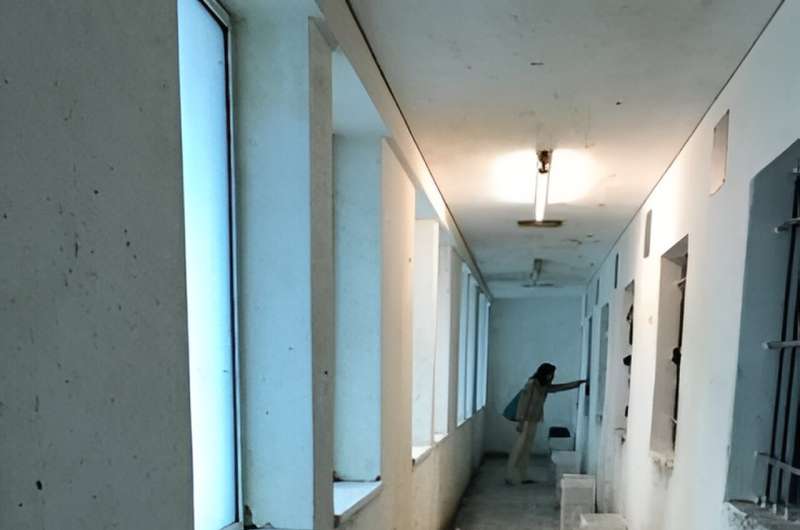This article has been reviewed according to Science X's editorial process and policies. Editors have highlighted the following attributes while ensuring the content's credibility:
fact-checked
trusted source
proofread
New database sheds light on violence in Greek detention facilities

The University of Oxford's Border Criminologies research network have contributed to the first interactive, open-source database of rights violations inside Greek detention centers.
Detention Landscapes, a partnership between Border Criminologies, Mobile Info Team and the Border Violence Monitoring Network pools testimonies, incident reports, open-source research, and visual evidence to create a unique resource which documents both the active and insidious forms of violence people on the move face within diverse spaces of containment in Greece.
Amidst ongoing reports of violence and deplorable conditions in Greece's detention centers, Detention Landscapes brings undeniable evidence of rights violations by Greek law enforcement personnel to the fore. It constitutes a living archive, which sheds light on the grim reality inside secretive detention sites where access is restricted, and people are detained in shocking conditions without access to legal remedies or support.
The research team hope that the database will be used widely by lawyers, researchers, and civil society actors to support litigation efforts to improve conditions in detention centers. The database also provides a model that can be replicated across different localities.
Mary Bosworth, Professor of Criminology and Co-Director of the Border Criminologies research group at the University of Oxford, said, "This database is a vital repository of evidence shining a light on violence happening in remote and hard-to-access detention spaces. We know from first-hand testimonies that people in detention frequently have their phones confiscated or broken and have very limited possibilities to communicate with the outside world, which directly prevents them from documenting the abuses they are subjected to."
"State actors attempt to keep detention sites as hidden spaces, with minimal public access or visibility as to how they operate. We created this platform so that journalists, researchers, lawyers, policy makers and civil society can collectively bring to light the conditions and abuses happening within secretive detention sites—ultimately so that perpetrators and governments can be held to account."
The new database, based on more than 10 years of research, includes:
- 48 Detention site profiles documenting the locations, functions, and ownership of facilities where foreign nationals are held under administrative detention;
- Over 80 testimonies from people who were previously detained in Greece, attesting to severe lack of access to services and support, and appalling living conditions;
- Over 70 photos and videos revealing dire physical conditions inside secretive detention sites;
- Over 100 incidents of violent human rights violations inside detention facilities;
- Over 350 resources including academic literature, reports, media articles, and contracts with useful information on immigration detention practices.
Testimonies gathered by researchers affiliated with BVMN, Mobile Info Team, and Border Criminologies between 2020 and 2024 attest to asylum seekers and undocumented people being detained in appalling conditions in prison-like facilities and overcrowded police stations. Individuals have reported brutal violence after long periods of arbitrary detention in degrading living conditions such as insect-infested cells and limited access to hot water, sufficient food, and medical care—even in emergency situations. These reports are not limited to individual facilities, but are endemic across the country in closed camps and pre-removal detention centers alike.
Violence was reported by 70% of respondents across 21 detention sites in Greece including pre-removal facilities, closed camps, police stations, and border guard stations.
The EU has spent at least 276 million euros into closed camps on the Greek Aegean islands in recent years. At the end of 2022 there were 2,813 people administratively detained in Greece—and a total of 37 staff deployed across all six pre-removal detention centers throughout the country, including both administrative staff and interpreters. This amounts to approximately six staff members for each pre-removal center, which are frequently overcrowded and without permanent medical staff on site.
Dr. Andriani Fili, co-director of Border Criminologies at Oxford University and research collaborator on the Detention Landscapes project said, "The motivation for Detention Landscapes was the lack of research into the use of physical violence within Greek detention facilities. Official statistics on the use of force in Greece simply do not exist, and concerns about ill-treatment are routinely dismissed as being exaggerated or unreliable, coming from migrants who want to secure their release. Having witnessed evidence of violence within these facilities first-hand, I became determined to find a way to systematically document this in a manner that would enable public scrutiny and accountability."
Nataliya Novakova, Europe Regional Manager, International Detention Coalition (IDC) said, "This is yet another proof that immigration detention is not a viable solution: it is damaging for people, who are survivors and have fled from armed conflicts or other threats. Criminalization and deterrence is not the face Europe should be showing to the world. Immigration detention is the last resort, not a default policy."
You can view the database on the Detention Landscapes website.
Provided by University of Oxford




















